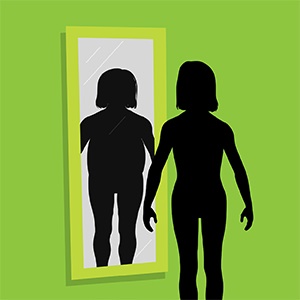

Get clued up on the four major eating disorders.
Your friend is almost always on a diet. She’s preoccupied with how much she eats each day, obsessively counts calories, and usually has excuses not to eat in front of you. Other days she eats more than her body can handle and is wracked with guilt afterwards.
Your friend may be struggling with an eating disorder.
Eating disorders are complicated illnesses that usually start in the mind (contrary to popular belief that it’s simply a “body” thing). These issues are characterised by abnormal eating habits and severe distress over body weight or shape.
An eating disorder can make people starve themselves, overeat or take on other unhealthy behaviour around food and body weight. Naturally, this can be damaging to your physical and mental health and wellbeing.
Eating disorders do not discriminate. These serious and often fatal illnesses can affect anyone.
What to know
There are four major eating disorders.
1. Anorexia nervosa: defined by an extremely low body weight, extreme and unnecessary weight loss, intense fear of weight gain, and distorted perception of self-image and body. The person has an unnatural fixation with a thin figure, and abnormal eating patterns (think starving themselves or lack of appetite).
Know the signs:
- Extreme weight loss.
- Chronic dieting.
- Harmful obsession with calories and fat.
- Distortion of body image.
- Abnormal drive to lose weight.
- Excessive exercising.
- Sleeplessness or lethargy
- Cessation of menstruation.
- Low body temperature.
- Fine downy hair growing on the face and body. This is the body’s way of conserving some warmth.
2. Bulimia nervosa: characterised by eating large amounts of food in a short period, followed by purging. This includes self-induced vomitting, laxatives or diuretics, and excessive exercising.
Know the signs:
- Constant weight fluctuations.
- Lack of control when eating.
- Eating in secret.
- Gastric reflux after eating or peptic ulcers.
- Disappearing to the bathroom after meals.
- Smelling of vomit.
- Chronic dehydration.
- Broken blood vessels in the eyes.
- Enlarged glands in the neck and under the jaw line.
- Cuts in the lining of the mouth or throat.
3. Binge-eating disorder: known by compulsive overeating or eating an unusually large quantity of food in a short period, while feeling unable to stop or control how much you’re eating. It often leads to unwanted weight gain and a negative self-image, which can reinforce further compulsive eating.
Know the signs:
- Eating a lot of food, despite not being hungry.
- Inability to stop or lack of sensation while eating.
- Eating until uncomfortably full.
- Never feeling satisfied, no matter how much you eat.
- Eating without actually tasting food.
- Stockpiling food.
- Gorging alone and then feeling guilty or disgusted after.
- Using food to cope with stress, anxiety or depression.
4. Avoidant/restrictive food intake disorder: a persistent pattern of disordered eating characterised by selective eating, a disinterest in certain foods, and poor appetite. It may look like picky eating, but it’s often a mental or developmental disorder.
Know the signs:
- Lack of appetite or interest in food.
- Avoiding specific foods based on taste, smell, texture or colour.
- Eating only a few types of food.
- Picky eating that worsens over time.
- Nutritional deficiency.
- Significant weight loss or failure to gain weight.
- Fear of negative consequences of eating, e.g. choking, vomitting, or allergic reaction.
- Dependence on nutritional supplements or tube feeding.
Help at hand
If you're worried that your friend (or even you) may have an eating disorder, speak out. But before you do, it's important to educate yourself about the disorder first.
- Choose the right time. Speak to your friend in private without any distractions. Have the conversation in an environment where she feels comfortable and safe. It's also important to have the conversation at a time of emotional calm. Don't talk if you're around food.
- Use your words wisely. Don't use language that implies blame or that she's doing something wrong. Avoid manipulative and threatening statements. This may worsen the eating disorder and make it more difficult for her to admit to the problem.
- Focus on feelings. Mention her eating habits , but don't stress it. Place the emphasis on her emotional state. Remember, she may be going through a lot of anxiety, stress and guilt, so be patient and prepared to deal with anger or denial.
- Listen without judgment. Truly listen and create a space for her to open up to you. Let her know that you won't judge or criticise her. Avoid giving her advice. Simply, hear her out and make her feel heard, even if you don't understand what she is going through.
- Encourage help. Other than offering your unconditional care and support, encourage her to seek treatment and help. Reassure her that you will be there each step of the way. Never force her to do anything she doesn't want to.





 Publications
Publications
 Partners
Partners














